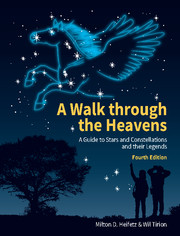Introduction
Published online by Cambridge University Press: 16 March 2017
Summary
This book is written for those who look at the stars with wonderment and would like to feel more at home with them, to go for a friendly walk with them.
In order to walk through the heavens and to know where you are, you must recognize what your eyes see. To call your neighbor by his or her name is the beginning of friendship. To know the names of stars and constellations is to form a friendship with our heavenly neighbors.
As we walk among the constellations, you will feel the immensity and quiet peace of the night sky. Do not ignore the legends about the constellations in Part 3 of the book. These legends will lend greater feeling to your vision of the world above. Friendship with the stars will deepen as we sense the thoughts and dreams of people who imagined people and animals living among the constellations.
Our walk will take us to the brightest stars in the sky. When we become familiar with them they will lead us to the dim stars.
It is not enough simply to find a constellation. Try to see relationships between constellations. This is best done if you know different pathways to the constellations.
Almost certainly the early cave dwelling people and probably the early forms of humans looked to the stars with a sense of awe. In their vivid imagination they joined certain bright stars together into patterns in which they imagined figures of animals or people with unusual attributes. These patterns, that we now call constellations, varied among different peoples across the world.
Almost certainly the early cave dwelling people and probably the early forms of humans looked to the stars with a sense of awe. In their vivid imagination they joined certain bright stars together into patterns in which they imagined figures of animals or people with unusual attributes. These patterns, that we now call constellations, varied among different peoples across the world.
Information
- Type
- Chapter
- Information
- A Walk through the HeavensA Guide to Stars and Constellations and their Legends, pp. 1 - 2Publisher: Cambridge University PressPrint publication year: 2017
